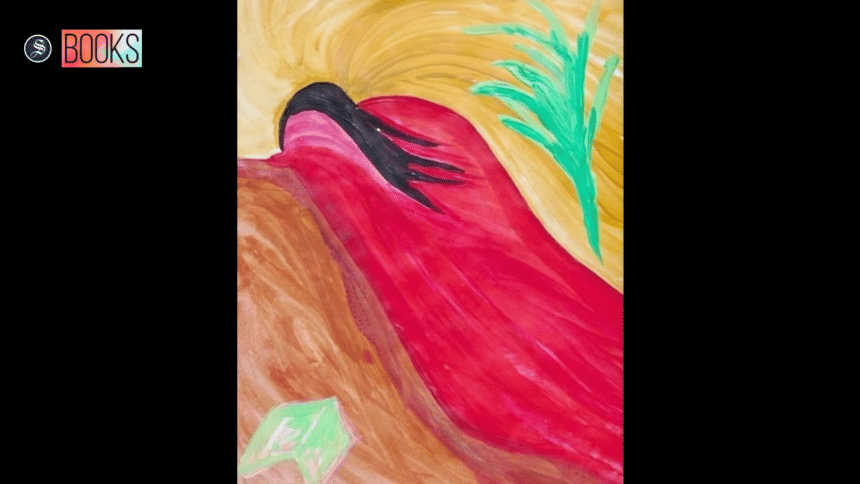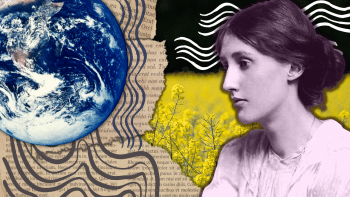On mothers and reading

These days, at the height of my semester break, I wake up at 12 PM, and have coffee—criminally indolently. I complain about the heat, the noise and the general air of unpleasantness in this city, and also about the fact that I don't write, and that I can't seem to get myself to do so.
My mother, having completed at least 50 tasks since morning, sits with her tea in a tulip glass while her brows digress. She politely moves on to tell me that I should wake up a little earlier. Dawns, donned in robes all rosy, are inexhaustible sources of inspiration, and early mornings the reservoir of Vitamin-D.
I agree, become visibly ashamed, and nervously ask her about what she has been up to. She breaks into a jazzy smile, proceeding to show me the orange dahlias flaunting themselves like proud lion heads at our balcony, accompanied by the boisterous tap-dance of the fat sparrows stopping for a drink.
Halfway through a Dev Anand song, we share what we have read the night before. I talk of Byatt through Barthes's praxis and how it all goes over my head. She tells me about how she had been slipping into states of dreamless torpor 30 minutes into the audiobook of Akshay Mulberry for the past three nights. We giggle.
I wonder at how these frugal, accessible pleasures define her daily existence and get elated with the fact that reading takes up a significant space on the shelf. Now, I break into a jazzy smile.
When I think of my mother in connexion to books or storytelling, disparate images slowly come into an embrace with one another like water bridges in a landscape painting. Some are sentimental like the smell of her lap in starched cotton saree while my head wafts with the heady shenanigans of Princess Vasilisa and such from Ukrainian folklore; others are more specific—appearing as bold strokes dominated by silhouettes of the characters or plots which enamour her.
I no longer remember when exactly she first guided my vision to be at awe with Patricia from Remarque's Three Comrades, who appears as a tragic figurine afflicted with lung haemorrhage and is sketched to be the paragon of grace, beauty, and love in the brutal post-war setting of the text. My mother, after an episode of reducing the novel to a set of unpleasant power structures and tired tropes, inevitably and ardently pulls it back up as an object of harmony by admiring the exquisiteness in it, portrayed through the explorations of themes such as camaraderie and love in the face of poverty and brutality.
And thus in my mind, nuance was created: Patricia appeared to be as a being of transient cloud-like instants, misty and melancholic, scythed by moonlight; yes, perhaps underdeveloped and outdated but beautifully done so.
Under a different tonal palette altogether, my mother's Marxist forays would often result in the introductions of authors in my diet, who slice our hearts open with their merciless observations and remind us of the varied viscosities of human existence. It was often her impassioned exclaims of misery and swift hand gestures which made me feel in my guts, Kushum's intentional stomps over Shashi Doctor's flower beds due to years of unreciprocated affection in Manik Bandopadhay's Putul Naacher Iteekotha, or Manto's metaphor of comparing the clandestine love affairs in the film industry as predatory "Khamchakhamchi" of jungle cats.
Virginia Woolf, in her essay "Hours in the Library", differentiates between the man who loves learning and the man who loves reading. She presents the latter subject as someone who is full of intense curiosities, to whom "reading is more of the nature of brisk exercise in the open air that of sheltered study", as opposed to the scholar to whom reading is often a sedentary, sunless pursuit.
Once on a walk around the streets of Kolkata I noticed the Romantic notion of the reader, as put forward by Woolf. It peered its head up in my mother, perfectly and palpably. As my senses stood stultified in the vegetative humidity, she let out a gasp upon coming across an address nameplate. Carved on a piece of white marble, the plate proudly stated that Kazi Nazrul Islam had resided in that particular building around 1929. It was a sight impeccably tender, somewhat odd: my mother weeping while the slight traces of the flaky meat pastries consumed earlier glistened like confetti in the golden haze of twilight. I felt our lazy trot manifest into a literary pilgrimage while she let out invocations in the name of the poet and the red of life.
As my mother pours down sugar to the incense bowl, she reminisces how she had named me after Joyeeta from Samaresh Majumdar's Gorbhodharini. She is moved and always perceptibly so, while talking of literature, and their magnificence, the disgust, and the pangs which deliver us.
I sigh thinking of the author's death last week. As the bubbles on the kitchen sink guzzle and plop, my mother smiles and talks about how joyous it is to have someone whose entire life's works are accessible to us.
I ponder on that. I realise, through her, time and time again that books and literature are life itself, joy itself—a surefire way to navigate oneself through worldly anxieties and towards a safe space of fluffy, cerebral delights.
Jahanara Tariq is a writer from Dhaka, Bangladesh. She reads across a wide range of genres and mediums. Her primary interests include but are not limited to, Formalism, Experimental Literature, Translated Literature and Anglophone Poetry. Other than books, she's also a keen observer of films and art. She is currently employed as an adjunct faculty at the Department of English and Modern Languages at Independent University, Bangladesh (IUB).

 For all latest news, follow The Daily Star's Google News channel.
For all latest news, follow The Daily Star's Google News channel. 










Comments